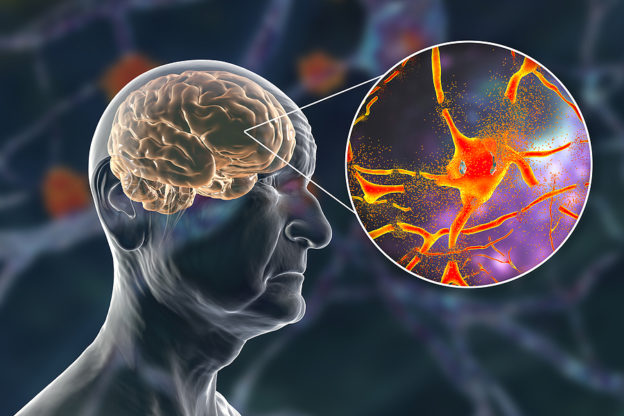By David Blyweiss, M.D., Advanced Natural Wellness
October 4, 2021
How do I prevent Alzheimer’s?
As a physician, this is a question I’m frequently asked. Really, there’s no cut and dry answer. But there are some wrong answers.
When talking about Alzheimer’s, we often refer to amyloid plaques and tau tangles. The common belief is that these are the underlying cause of the disease – and that if you get rid of them, you’ll be cured.
But that theory has been proven wrong, over and over again.
First off, every time they’ve developed a drug to reduce levels of these proteins, it hasn’t work. Instead, these experimental drugs seem to make matters worse.
Second, autopsies show that elderly people who never had memory loss – and even had superior thinking skills late into life – have highly dense plaques and tangles in their brains. But they never showed a single symptom of Alzheimer’s.
What’s the difference between people with amyloid plaques who develop Alzheimer’s, and those who don’t?
Inflammation!
MD Exposes the Hidden Danger to Your Eyes

When your eyesight starts to fail, it's a real problem. Suddenly you can't go to the grocery store... you can't get to the doctor if you have an emergency... you can't meet your friends for dinner…
Your "regular" doctor doesn't have time to keep up with the latest research. And the same goes for eye doctors. They go to school to learn how to fit you for glasses and contacts, but have no way of preventing the damage and loss of eyesight that threatens your freedom and independence.
Let me show you something that explains a LOT about how your eyes work.
In my FREE Special Report, I'll show you a HUGE, untapped resource for your eyes that safely and naturally restores clear, effortless eyesight.
Click here to get started...
What Causes Alzheimer’s Related Inflammation?
The fact is, amyloid plaque and tau are produced by the brain to protect itself from inflammatory conditions that would harm it. But when high levels of brain inflammation continue, it drives the spread of misfolded plaques and tangles and, eventually, leads to dementia.
There are a lot of inflammatory factors in our lives. But some of the biggest contributors to Alzheimer’s disease include…
Poor sleep habits. The brain: Takes up two percent of the body’s weight and twenty percent of it’s energy needs, every day.
When you sleep it opens your brain’s ventricular highway. Cerebral spinal fluid flushes out all the damaging debris and oxidative stress that accumulates from metabolic processing and information gathering and transmission all day long, via the glymphatic system.
If you don’t get enough sleep, or if you wake up a lot during the night, this system can’t do its job. Your brain isn’t getting cleared of waste and creates an inflammatory state in your brain.
Central obesity. Visceral fat, which accumulates around the belly, is highly inflamed in obese patients. It produces large quantities of inflammatory cytokines which play a central role in the brain’s inflammatory response that results in Alzheimer’s disease.
Obese individuals with central obesity have about a 3.5 times increased risk of dementia. Even people who are at a healthy weight have an estimated two times higher risk if they are carrying around extra belly fat.
Diabetes. High blood sugar is a potential cause of Alzheimer’s because the sugar binds with what we know of as hemoglobin A1C to form what is called advanced glycation end products… AGES; misfolded proteins that add fuel on the fire of potential chronic systemic inflammation.
And the more hemoglobin A1C you have, the more misfolded proteins you’ll have – especially in your brain. This is why Alzheimer’s is often called type 3 diabetes.
High homocysteine levels. This amino acid is normally present in the body. But when levels are high, it becomes highly inflammatory and has a toxic effect on the brain. The brain protects itself by producing more amyloid deposits and tau. Even moderately raised homocysteine can increase the risk of dementia up to 2.5 times in older people.
The World's Quickest Solution for Ending Prostate and Urinary Misery
This has recently been revealed to be one of the only real breakthroughs in prostate health.
The seeds of a strange fruit (sometimes called "Chinese Apples") hold powerful phytonutrients that are a revolution in prostate health.
In fact, UCLA and Veterans Administration research have now proved this to be true.
Not only that, but it may be the worlds quickest solution for ending prostate misery.
Simply stated, these phytonutrients represent a huge step beyond beta sitosterol, saw palmetto, and other phytosterols alone.
Simply click HERE if you want to have fast prostate relief...restful, uninterrupted sleep...no more constant "urges to go"...enhanced virility...and optimal prostate support for life.
Leaky brain. I’m talking about a membrane called the Blood-Brain Barrier (BBB). This barrier naturally has junctions — like doorways — that allow certain materials to pass in and out. It’s designed to keep the toxins and pathogens out of the brain.
Systemic inflammation can cause the actual neurovascular bundle’s membrane integrity to break down, allowing waste material to get in. This leads to neural inflammation that is associated with Alzheimer’s disease.
Knock Inflammation out of Your Brain
If Alzheimer’s is driven by inflammation, the key, then, is to drive inflammation out of your brain.
First, aim for a good night’s sleep, every night. If you’re not getting at least a solid seven hours a night, all of the damaging debris and oxidative stress you’ve accumulated in your glymphatic system during the day won’t get flushed out. Plus, poor sleep habits are linked with inflammation. This makes developing great sleep habits very important.
Get your metabolism in order. Obesity and diabetes go hand-in-hand. Get one under control and you’ll get the other under control.
Besides physical activity, one of the best ways to lose weight is to restrict the amount of time you spend eating food each day. For example, I only spend about seven or eight hours every day eating. The rest of the time I am fasting — only drinking clear liquids.
Of course, you need to eat healthy foods during your feeding hours. Add plenty of healthy, organic, plant-based foods to you diet and limit your consumption of junk foods and meat. Not only can this help with weight loss. These daily fasting periods give your body time to clean out inflammatory junk cells.
Lowering homocysteine levels is often as easy as taking a few supplements. Depending on your levels, your doctor will likely prescribe a B complex vitamin with sufficient B6, B12 and folic acid/folate daily to help lower this potentially toxic amino acid.
And what about that leaky brain?
Well, systemic inflammation, poor sleep, obesity, diabetes and high levels of homocysteine all contribute to leaky brain – all of the same things that lead to Alzheimer’s disease!
So when you begin to take care of the rest, it will take care of itself.
SOURCES:
Pascoal, T.A., Benedet, A.L., Ashton, N.J. et al. Microglial activation and tau propagate jointly across Braak stages. Nat Med. 2021:27;1592–1599.
Alam Q, Alam MZ, Mushtaq G, Damanhouri GA, Rasool M, Kamal MA, Haque A. Inflammatory Process in Alzheimer’s and Parkinson’s Diseases: Central Role of Cytokines. Curr Pharm Des. 2016;22(5):541-8.
Cereda E, Sansone V, Meola G, Malavazos AE. Increased visceral adipose tissue rather than BMI as a risk factor for dementia. Age and Ageing. 2007:35(5); 488–491
Whitmer RA, Gustafson DR, Barrett-Connor E, Haan MN, Gunderson EP, Yaffe K. Central obesity and increased risk of dementia more than three decades later. Neurology. 2008 Sep 30;71(14):1057-64.
Debette S, Beiser A, Hoffmann U, et al. Visceral fat is associated with lower brain volume in healthy middle-aged adults. Ann Neurol. 2010;68(2):136-144. doi:10.1002/ana.22062
Van Dyken P, Lacoste B. Impact of Metabolic Syndrome on Neuroinflammation and the Blood-Brain Barrier. Front Neurosci. 2018 Dec 11;12:930.
Stocker H, Nabers A, Perna L, Möllers T, Rujescu D, Hartmann A, Holleczek B, Schöttker B, Gerwert K, Brenner H. Prediction of Alzheimer’s disease diagnosis within 14 years through Aβ misfolding in blood plasma compared to APOE4 status, and other risk factors. Alzheimers Dement. 2020 Feb;16(2):283-291.
Smith AD, Refsum H, Bottiglieri T, Fenech M, Hooshmand B, McCaddon A, Miller JW, Rosenberg IH, Obeid R. Homocysteine and Dementia: An International Consensus Statement. J Alzheimers Dis. 2018;62(2):561-570.
Rhea EM, Salameh TS, Logsdon AF, Hanson AJ, Erickson MA, Banks WA. Blood-Brain Barriers in Obesity. AAPS J. 2017;19(4):921-930.
Kamath AF, Chauhan AK, Kisucka J, et al. Elevated levels of homocysteine compromise blood-brain barrier integrity in mice. Blood. 2006;107(2):591-593.







